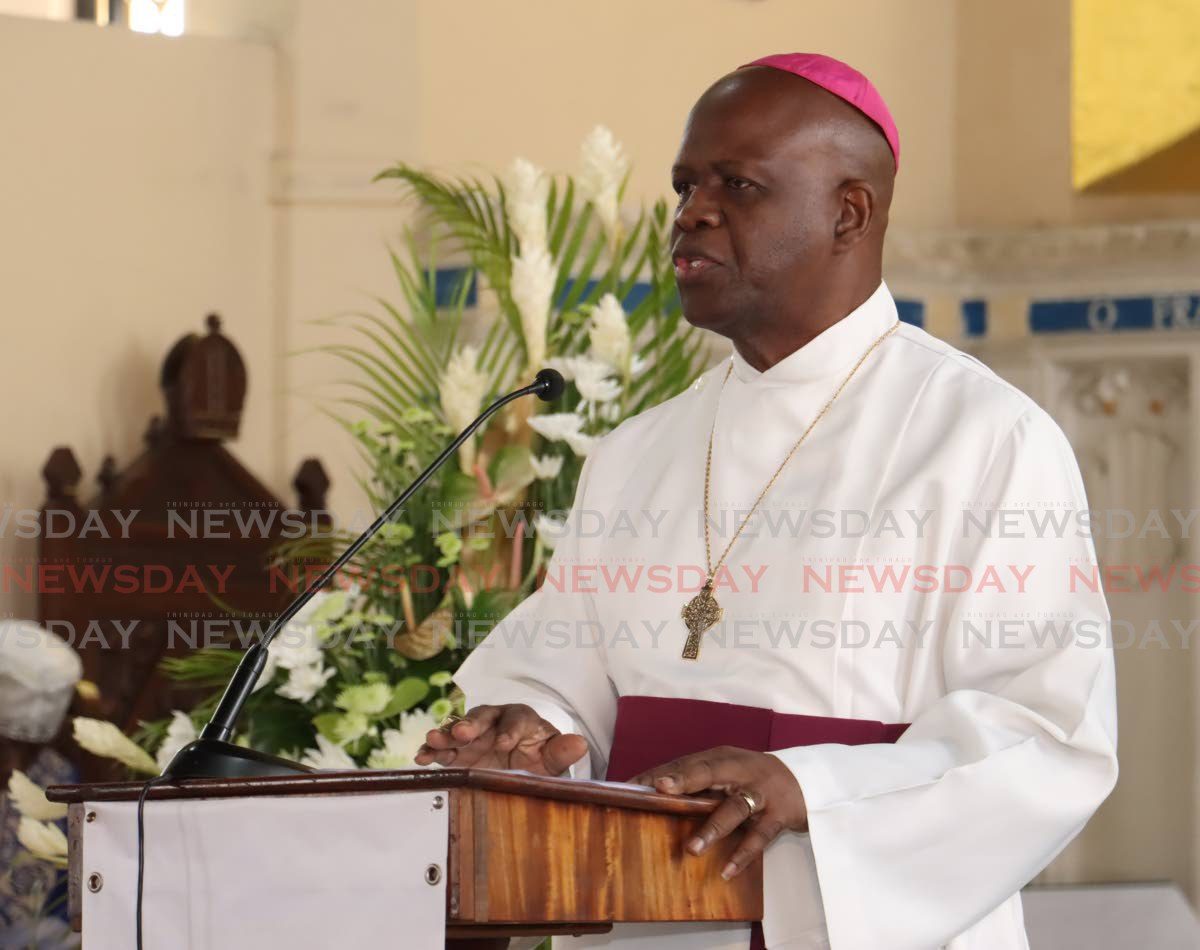By Corey Connelly
Copyright newsday

BARBADOS Prime Minister Mia Mottley believes the teachers at Bishop’s High School, Tobago, over the past century, instilled in their students a desire to excel way beyond the confines of the island.
She delivered remarks at the school’s centennial awards ceremony at the Shaw Park Cultural Complex on September 6.
Mottley, in a pre-recorded address, asked, “Do you think it is coincidental that a school that has benefitted so handsomely from the input of some of the region’s most regarded educators can boast of such a distinguished honour role?”
Saying it was not just about the names on the honour role but what they represent, she mentioned the achievements of former prime minister Dr Keith Rowley, late prime minister and president ANR Robinson and former Caricom general secretary Edwin Carrington as examples of people who were not just proud citizens of Trinidad and Tobago but staunch advocates of regionalism.
“They were nurtured on the Bishop’s High school environment that had no place for insularity and they lived that philosophy throughout their professional lives.
“They, like the institution we celebrate, helped to build a region that is poised for unmatched greatness, if we could rid ourselves of the remaining shackles of colonialism. I believe that we can do it.”
Mottley said Bishop’s, although still relatively young in the context of regional educational institutions, reflects a solid truth about how the region and its nations have been differently and uniquely blessed and how they have exploited those blessings.
“Today, as we work on initiatives such as free movement within our region, the Bishop’s High School’s journey is a very potent reminder that our natural inclination to interact among ourselves, to assert our Caribbean oneness, freed of political inhibitions, just might flourish.”
She also expressed hope that the school’s “rich and powerful legacy” will continue for another hundred years.
Outstanding Bishopians
Rowley, THA Chief Secretary Farley Augustine and Chief Justice Ivor Archie were among 100 Bishopians honoured during the ceremony.
Also making the list were former independent senator Dr Eastlyn Mc Kenzie, cultural luminary Annette Nicholson-Alfred, Innovative Democratic Alliance political leader Dr Denise Tsoiafatt Angus and sprinter Semoy Hackett.
Medals also were presented posthumously to former prime minister and president ANR Robinson, former Deputy Chief Secretary Cynthia Alfred and educator Dr Cyril Collier.
A highlight of the school’s centennial celebrations, the function paid tribute to alumni who have distinguished themselves in various spheres of endeavour, locally, regionally and in the wider world.
Medals were presented to outstanding Bishopians in the fields of politics, business, education, public service, sports, culture, the arts, among other areas.
In his welcome remarks, George Leacock, chair of the centennial awards committee, observed that Bishop’s High School and Tobago, generally, claims very little by way of its own written history.
He observed many recipients also appeared shy and reluctant to acknowledge their own achievements.
“Despite these obstacles we persevered. We have completed the task and we stand by it,” Leacock said of the selection process.
Leacock suggested that Bishop’s document its own history by recording the accomplishments of its current and past students in sport, culture, the arts, academia, politics and in other spheres where they continue to make their mark.
He said, “Instead of waiting for another century to do this again, the school should do an honour role every ten years at least. I am pretty certain that in a hundred years, I’ll be quite busy and not available to do another exercise like this. That way the record will grow organically and it will all be relevant to everyone in the period in which they are able to experience it.”
That way, Leacock added, the history of the school and its accomplishments will be enriched.
He said at the close of the centennial celebrations, a commemorative magazine will be published, containing a full dossier of the awardees and their achievements.
Leacock thanked the centennial awards committee and all who gave their time and effort to make the celebration possible.
Beacon of excellence
Allan Richards, speaking on behalf of the board of management, said Bishop’s has stood as a beacon of excellence, leadership and service over the past 100 years.
He said the school’s centennial concert on September 4 at the complex showcased the talents of the school’s alumni.
“The alumni presented a five-hour concert on September 4 of exceptional professional quality, exemplifying the talent cultivated at Bishop’s High School,” Richards said.
“Of those five hours, each of the 28 performers were all past students. It was a concert that was worthy of any professional event of its nature and, I dare say, anywhere in the world.”
He added the visual and literary arts exhibition, held on September 5, also highlighted the creativity of Bishopians.
Richards, who also was a member of the centennial awards committee, urged guests to attend the Founder’s Day church service at the complex on September 14. The school opened its doors to its first batch of students on September 14, 1925.
He said the centennial celebrations should inspire all who share in the institution’s journey to uphold the spirit of Bishop’s High School.
“Let us continue to foster pride, inspiration and transformation for the generations to come.”
Paving the way for ensuring generations
Zelma Cowie, chair of the centennial organising committee, lauded the school’s pioneers for paving the way for ensuing generations of Bishopians.
Describing the school as a “beacon of innovation and dedication,” Cowie said, “We stand on the shoulders of the giants who went before. So we honour not just a century of history but a legacy of excellence.
“We recognise those individuals who have poured their hearts, souls and minds into this organisation called Bishop’s High School and for making it what it is – a beacon to the world.”
She said Bishop’s history is Tobago’s legacy.
“And it is a legacy that we have extended to the world.”
Cowie thanked the awardees for their contribution.
“Thank you for your commitment because you have set the standard for us all. You are the embodiment of our mission and the reason for our success.”
She said while it was important to reflect on the school’s journey, attention also must be paid to the future.
“The foundation has been built. And that foundation that you have helped to build is a strong one and with your continued leadership, your continued inspiration, the next century will be even brighter.”
Cowie recognised the school’s principal, staff, students on whom, she said, the mantle of leadership lies to take the institution forward.
‘Quality residing in the cowshed’
Anglican Bishop The Rev Claude Berkley recalled the work of Arthur Henry Anstey, late Bishop of Trinidad and Tobago, in integrating education into the mission of the church and meeting the needs of all students, regardless of socio-economic background.
Berkley said he was a living testament of how the institution positively impacted his life and that of others.
“As we join in these celebrations, keep in mind the word transformation. I am testament to that transformation because I am still thinking, ‘How did Claude Berkley get into the list of awards having come from countryside, the son of a labourer and a domestic who actually worked in the church?’
“But it speaks to the undercurrent of Anstey’s vision for the other people, those who were considered out of the regular class of privilege. So we can stand with the best in the world.”
Berkley supported Leacock’s view that the institution needed to document its own history.
“We have to ensure the story is written because they always told us in Third World theologies, the day that the prey writes the story, the story will be a very different one.
“For the distinguished people that we are, we need to record our own stories so that those who come after us will not second guess themselves and will not be lost in seeking to find out who they are and what is their purpose.”
Berkley also recalled hearing the school being referred to as a cowshed during a part of his stay there.
“I just couldn’t understand how a cowshed could produce so many people with some many distinctions in their O’Levels and A’ Levels. Then you have to understand, it’s not the cowshed.
“There was a quality residing in the cowshed or the now distinguished halls and we pray that that quality will be sustained and will continue maybe for the next 100 years in the first instance.”
Comraderie, sportsmanship and commitment
Historian Dr Rita Pemberton responded on behalf of the awardees.
She praised the school’s house system, saying it promoted comraderie, sportsmanship and commitment.
The houses were Davies, Reid, Anstey and Bowles.
“The healthy team spirit that was fostered by the house system was, in fact, a ground for preparation for life but for sportsmen and women particularly,” Pemberton said.
“In the world of competition, it is a real dog eat dog and people get vex and cry…..but the ground provided by that friendly internal rivalry was really a base for an important part of the students’ development.
“The house system actually helped to prepare young people for their roles in society for developing a commitment to the group and wherever they go they remain ‘Ansteyians’ with pride.”
She also applauded the school’s emphasis on giving back.
“The culture of giving back is very strong in the school. People gave of their resources, their skills, their talents and, at the same time, the island as a whole.
“We, the awardees have benefitted from the efforts of the teachers and the many helping hands of parents and past students.”
In moving forward, Pemberton said emphasis must be placed on decolonising the island’s education.
“We must teach more about Tobago right through the school system. We must teach about the literary genius that we have produced on the island, Eric Roach being one of them who has been, unfortunately, quite silent.
“But I don’t know if anywhere in the school system we are taught the history of Tobago, the importance of the Main Ridge Forest.”
Attention, she said, also must be paid to Tobago’s traditions, particularly its language.
“We need to do more with regard to having a history of Bishops High School that people can read about for the next generation.”



